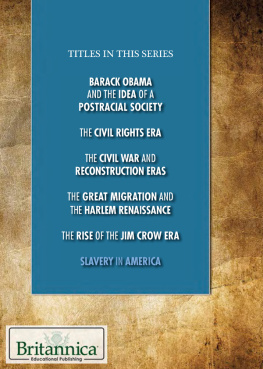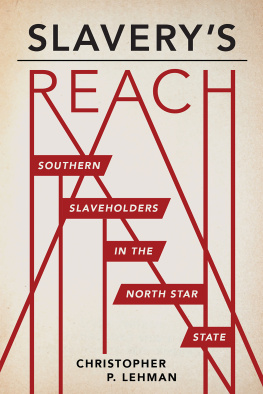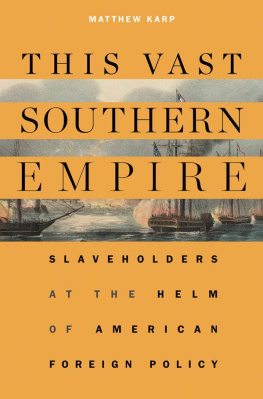1999 The University of North Carolina Press All rights reserved Designed and typeset in Minion by Eric M. Brooks Manufactured in the United States of America The paper in this book meets the guidelines for permanence and durability of the Committee on Production Guidelines for Book Longevity of the Council on Library Resources.
Library of Congress Cataloging-in-Publication Data
Young, Jeffrey Robert.
Domesticating slavery: the master class in Georgia and South Carolina, 16701837 / Jeffrey Robert Young.
p. cm.
Includes bibliographical references and index.
ISBN 0-8078-2490-9 (cloth: alk. paper).
ISBN 0-8078-4776-3 (pbk.: alk. paper)
1. SlaveholdersGeorgiaAttitudesHistory.
2. SlaveholdersSouth CarolinaAttitudesHistory.
3. SlaveryGeorgiaJustification. 4. SlaverySouth CarolinaJustification. 5. Plantation lifeGeorgia.
6. Plantation lifeSouth Carolina. 7. GeorgiaPolitics and government17751865. 8. South CarolinaPolitics and government17751865. I. Title.
E445.G3Y68 1999
306.3620975709033dc21 9849757 CIP
03 02 01 00 99 5 4 3 2 1
Acknowledgments
After many years of benefiting from assistance offered by sympathetic institutions and individuals, I take great pleasure in acknowledging those who made this work possible. First and foremost, I must thank the librarians and archiviststoo numerous to name individuallywho patiently answered questions about collections, provided access to manuscript collections, ordered obscure titles through interlibrary loan, and expressed the kind of interest in a project that maintains the authors own level of excitement. In particular, I received the finest imaginable treatment from the staff at the Charleston Library Society, the Clements Library at the University of Michigan, the Georgia Department of Archives and History, the Georgia Historical Society, the Manuscripts Division of the Library of Congress, the New York Public Library, the New-York Historical Society, the Newberry Library, the Perkins Library at Duke University, the South Carolina Department of Archives and History, the Southern Historical Collection at the University of North Carolina at Chapel Hill, and the Virginia Historical Society. The South Caroliniana Library at the University of South Carolina became my home for three productive and happy months. There, Laura Costello and Henry Fulmer steered me toward valuable collections and, just as important, made me feel welcome.
In my travels around the country, I encountered no finer library staff than the one serving the Emory University community. Eric and Marie Nitschke hunted down answers to questions that made merely mortal reference librarians stumble, and Jerrold Brantleys friendship brightened my mood during many long months in the microfilm room. The staff at the interlibrary loan office demonstrated an inexhaustible reservoir of goodwill as they tracked down countless sources.
The Department of History at Emory University provided me with a first-class graduate education. Patrick Allitt, William Beik, Michael Bellesiles, Geoff Clark, Elizabeth Fox-Genovese, Margot Finn, Eugene Genovese, Fraser Harbutt, John Juricek, Jamie Melton, Mary Odem, Randy Packard, Susan Socolow, and Sharon Strocchia created a supportive and stimulating environment for graduate coursework and research. Jonathan Prude carefully reviewed the manuscript, pressed me to develop my ideas about capitalism and culture, and offered me much-needed encouragement. Dan Carter took time to answer my questions, to write countless letters of recommendation, and, on one very memorable occasion, to tell me how to install a tape deck in my car (our friendship survived the electrical fire).
The roots of this project extend backward to the old Cox Hall dining room at Emory, where I participated in a number of highly caffeinated, high-cholesterol discussions with Ellen Barnard, Dan Costello, Sarah Gardner, and Diane Burke. Their perspectives on southern history enriched and challenged my own. Sarah Gardner also graciously agreed to split my housing expenses in a memorably filthy sublet apartment in Chapel Hillphysical surroundings that were grim enough to keep us in the archives during every waking hour. Laura Crawley, Christine Jacobson Carter, Stacey Horstmann, and Andrew Silver helped to make my experience in the Mellon Southern Studies Seminar both rewarding and enjoyable. Dave and Vicki Haviland opened their home to me in Washington, D.C., and Ursula Pallares provided me with a wonderful place to stay in Columbia, S.C.
I received crucial financial assistance from the Department of History, the Graduate School of Arts and Sciences, and the Mellon Southern Studies Program at Emory University. The Pew Program in Religion and American History at Yale University funded me for a year while I wrote a significant portion of the manuscript. I am also deeply grateful for grants that I received from the Georgia Chapter of the Colonial Dames of America and the North Caroliniana Society.
At conferences that I attended and archives that I visited over the years, I have made the acquaintance of many scholars willing to listen to my ideas and to offer their own advice, some of which I have been wise enough to act on. Peter Coclanis agreed to read my prospectus back in 1993. Since then, he has read the entire manuscript several times and has strengthened it immeasurably with his keen insight into the history of the South and the early modern world. I am also especially grateful for support and advice offered by Robert Forbes, Lacy Ford, Grace Hale, John Inscoe, Jane Pease, William Pease, David Shields, and Mart Stewart.
A number of my former colleagues at Illinois State University shared with me their historical expertise on subjects that made their way into the manuscript. For their help, I thank Mari-Paz Balibrea-Enrquez, Jorge Canizares Esguerra, John Freed, and Lou Perez. I survived the midwestern winters because of the friendship offered by, among others, Lee Beier, Maura Doherty, John Gill, Virginia Gill, Jin Lee, Richard Soderlund, Jennifer Travis, and Mohamad Tavakoli-Targhi. My new colleagues at Georgia Southern UniversityJon Bryant, Walter J. Fraser, Georgina Hickey, Annette Laing, and Anastatia Simshave welcomed me back to Georgia and have shared with me their vast knowledge of southern history. Jerry Steffen deserves praise for encouraging my research and easing my transition into a new university system. I also thank Lewis Bateman, Pamela Upton, Nancy Raynor, and the rest of the staff at the University of North Carolina Press for guiding this work to publication.
I have not had the privilege of meeting Willie Lee Rose, but I most certainly profited from her pathbreaking work on the question of slaveholder ideology. I selected the title of this book to pay tribute to her essay The Domestication of Domestic Slavery, which first led me to ponder the timing by which the slaveholders developed their world view.
A portion of Chapter 5 first appeared as part of my article Ideology and Death on a Savannah River Rice Plantation, 18331867: Paternalism amidst A Good Supply of Disease and Pain, Journal of Southern History 59 (November 1993): 673706. Advice offered by John Boles, the journals anonymous readers, and the journals editorial staff enabled me to make fruitful revisions of this material.
Without the love and support of my family and friends, I could never have embarked on (let alone completed) this project. My parents, Jack and Joanne; my brothers, Jonathan and Jason; and my grandmother Frances Kass have been extremely generous, both emotionally and financially. I hope the publication of this book convinces them that I have not been sleeping too late and relaxing too much all these years. Todd Mages has been a source of reliable and sensible counsel since I met him in 1971. Jon Feldman has joined me in many valuable discussions about race relations and American history. And my friends Eric Wallen and John Wollaeger have provided much amusement and, more recently, free medical advice dispensed over the phone. I must also thank both Cynthia Bansak (for helping me to survive my initial move to Atlanta) and Louis Corrigan (for listening patiently to my ideas about literature and culture).




